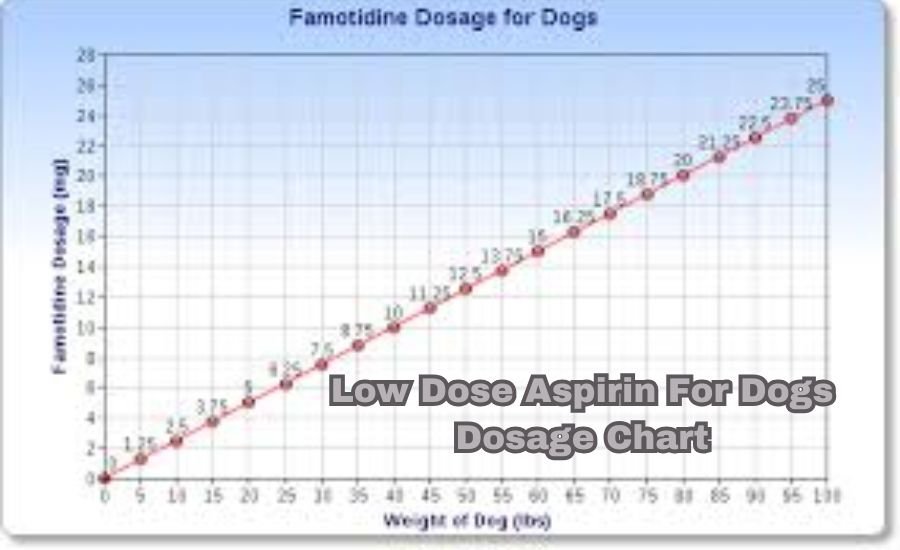Knowing the right treatment is essential when your dog is in pain or dealing with inflammation. A low dose aspirin for dogs dosage chart can help pet owners understand how much of this common medication is safe for their furry companions. While low-dose aspirin, also called baby aspirin, is sometimes recommended for dogs, it’s crucial to use it carefully.
This guide will walk you through everything you need about using low-dose aspirin for dogs. From its benefits and risks to creating a safe dosage plan, you’ll learn how to make informed decisions for your pet’s health. Always remember that giving aspirin to your dog without consulting a vet can lead to severe issues. Still, with the proper knowledge and guidance, it can be a helpful tool in managing your dog’s discomfort.
Low Dose Aspirin For Dogs Dosage Chart
| Dog’s Weight | Low-Dose Aspirin Dosage | Frequency | Notes |
| 5 lbs | 25-50 mg | Every 12 hours (twice daily) | Use baby aspirin (81 mg), splitting the tablet if needed. Consult your vet before use. |
| 10 lbs | 50-100 mg | Every 12 hours (twice daily) | Ensure proper monitoring for side effects like vomiting or lethargy. |
| 20 lbs | 100-200 mg | Every 12 hours (twice daily) | Buffered or enteric-coated aspirin is recommended to minimize stomach irritation. |
| 30 lbs | 150-300 mg | Every 12 hours (twice daily) | Avoid exceeding the upper limit; smaller, frequent doses are safer. |
| 40 lbs | 200-400 mg | Every 12 hours (twice daily) | Watch for symptoms of overdose, such as excessive drooling or unsteady movement. |
| 50 lbs | 250-500 mg | Every 12 hours (twice daily) | Aspirin is not suitable for dogs with pre-existing health conditions like kidney or liver issues. |
| 60 lbs and above | 300-600 mg | Every 12 hours (twice daily) | Large dogs may tolerate higher doses but always follow your vet’s guidance for safety. |
Important Notes
- Always consult your veterinarian before giving aspirin to your dog.
- Dosages are approximate and must be tailored to your dog’s specific needs, health status, and condition.
- Never use aspirin for long-term treatment without veterinary approval. For chronic issues like arthritis, ask about safer alternatives like canine-specific NSAIDs.
- Do not give aspirin to puppies or pregnant dogs.
What Is Low-Dose Aspirin and Why Is It Used for Dogs?
Low-dose aspirin refers to a smaller amount of the medication than what is typically used for adults. Commonly referred to as baby aspirin, it contains about 81 mg per tablet, compared to regular-strength aspirin, which contains 325 mg per tablet.
For dogs, low-dose aspirin may be recommended in specific situations, such as:
- Pain management: Relieving discomfort caused by minor injuries or chronic conditions like arthritis.
- Anti-inflammatory effects: Reducing inflammation in conditions like hip dysplasia or soft tissue injuries.
- Blood thinning: Helping prevent blood clots in dogs with heart disease or clotting disorders.
While low-dose aspirin can be beneficial, a veterinarian must always supervise its use, as dogs metabolize medications differently from humans. Improper dosing or prolonged use can result in serious health issues.
How Does Low-Dose Aspirin Work in Dogs?
Low-dose aspirin belongs to the nonsteroidal anti-inflammatory drug (NSAID) class. It works by inhibiting cyclooxygenase (COX) enzymes, specifically COX-1 and COX-2. These enzymes play a role in the production of prostaglandins, which regulate pain, inflammation, and blood clotting.
In dogs, aspirin can:
- Relieve Pain: By reducing the production of prostaglandins, aspirin helps decrease the sensation of pain.
- Reduce Inflammation: This mainly benefits osteoarthritis, where inflammation contributes to joint pain and stiffness.
- Act as a Blood Thinner: In some instances, aspirin may be prescribed to improve blood flow or prevent clot formation in dogs with cardiovascular conditions.
However, while these benefits are significant, aspirin also affects prostaglandins that protect the stomach lining and kidneys. This can lead to side effects like gastric irritation or, in severe cases, ulcers and kidney damage.
When Should You Consider Using Low-Dose Aspirin for Your Dog?
A veterinarian may recommend low-dose aspirin in specific scenarios, such as:
- Arthritis or Joint Pain: Dogs with osteoarthritis or chronic joint pain may benefit from aspirin’s anti-inflammatory properties.
- Post-Surgical Recovery: To manage mild pain or inflammation after surgery.
- Mild Injuries: For sprains, strains, or soft tissue injuries.
- Heart Disease or Clotting Disorders: To reduce the risk of blood clots in certain cardiovascular conditions.
Aspirin is generally not a first-line treatment for pain or inflammation in dogs. Veterinarians often prefer NSAIDs specifically designed for dogs, which are safer for long-term use. Aspirin is commonly used for short-term relief or when other options are unavailable.
Potential Risks of Aspirin for Dogs
While low-dose aspirin can be effective, it is not without risks. Some of the potential side effects include:
- Gastrointestinal Issues: Aspirin can irritate the stomach lining, leading to vomiting, diarrhea, or loss of appetite. In severe cases, it may cause stomach ulcers or bleeding.
- Kidney Damage: Prolonged or excessive use of aspirin can reduce blood flow to the kidneys, potentially leading to kidney damage or failure.
- Liver Damage: Though less common, high doses or prolonged use may strain the liver.
- Aspirin Toxicity: Administering an incorrect dose or giving aspirin to a dog with certain health conditions can lead to toxicity, which is life-threatening.
Understanding these risks underscores the importance of consulting a veterinarian before giving your dog aspirin.
Is Aspirin Safe for All Dogs?
Aspirin is not safe for every dog. Age, size, medical history, and concurrent medications can influence suitability. Here are some situations where aspirin may not be safe:
- Puppies under 12 Weeks old: Their livers and kidneys are not fully developed, making it harder for them to process medications.
- Pregnant or Nursing Dogs: Aspirin can harm developing puppies or pass through milk to nursing pups.
- Dogs With Pre-Existing Conditions: Kidney, liver, or gastrointestinal issues are at higher risk of complications.
- Dogs on Other Medications: Aspirin may interact with other NSAIDs, steroids, or anticoagulants, increasing the risk of side effects.
Your veterinarian can assess whether aspirin is safe and appropriate for your dog.
Signs of Aspirin Toxicity in Dogs
Aspirin toxicity can occur when a dog consumes too much aspirin or if it is given to a dog with an underlying health condition. Symptoms of toxicity include:
- Vomiting (sometimes with blood).
- Black, tarry stools (indicative of gastrointestinal bleeding).
- Loss of appetite.
- Lethargy or weakness.
- Difficulty breathing.
- Seizures or tremors.
If you suspect aspirin toxicity, discontinue use immediately and contact your veterinarian or an emergency animal clinic.
Understanding Dosage: How Much Aspirin Is Safe for Dogs?
The appropriate dosage of aspirin for dogs depends on their Weight. Veterinarians typically recommend 5-10 mg per pound of body weight, administered every 12 hours. This guideline is critical to follow to avoid overdosing.
Here is a general dosage chart:
| Dog’s Weight (lbs) | Low Dose (mg) |
| 10 | 50-100 |
| 20 | 100-200 |
| 30 | 150-300 |
| 40 | 200-400 |
| 50 | 250-500 |
Important Note: Always confirm the dosage with your veterinarian, as individual needs may vary.
How to Administer Aspirin to Dogs Safely
To ensure the safe administration of aspirin:
- Use the Correct Formulation: Opt for buffered or enteric-coated aspirin, which is gentler on the stomach. Avoid flavored human aspirin products, as some may contain xylitol, which is toxic to dogs.
- Give With Food: Administer aspirin with a meal to minimize the risk of stomach irritation.
- Measure Carefully: Use the smallest effective dose and avoid exceeding the veterinarian’s recommendation.
Aspirin vs. Other Pain Relievers for Dogs
While aspirin is an option, veterinarians often prefer NSAIDs specifically designed for dogs. Some alternatives include:
- Carprofen (Rimadyl): A commonly prescribed canine NSAID.
- Meloxicam (Metacam): Effective for inflammation and pain management.
- Firocoxib (Previcox): Often used for arthritis and post-operative pain.
These medications are generally safer for long-term use and tailored to a dog’s physiology.
Alternatives to Low-Dose Aspirin for Dogs
If aspirin is not suitable for your dog, consider these alternatives:
- Prescription NSAIDs: Designed for canine use, these offer similar benefits with fewer risks.
- Joint Supplements: Glucosamine, chondroitin, and omega-3 fatty acids can support joint health and reduce inflammation.
- Physical Therapy: Techniques like hydrotherapy and massage can alleviate pain.
- Natural Remedies: Turmeric, CBD oil, or acupuncture may provide relief for some dogs.
Preparing a Low-Dose Aspirin Dosage Chart for Your Dog
Keeping a personalized dosage chart helps ensure safe administration. Document:
- Your dog’s Weight and corresponding dose.
- The frequency of administration.
- Any observed side effects.
This chart can serve as a reference for both you and your veterinarian.
Monitoring Your Dog During Aspirin Use

When giving your dog aspirin, monitor their health closely for side effects or adverse reactions. Signs to watch for include:
- Changes in appetite or behavior.
- Vomiting, diarrhea, or dark stools.
- Increased lethargy.
Regular check-ins with your vet can help ensure your dog remains healthy during aspirin use.
When and Why You Should Stop Administering Aspirin to Your Dog Immediately
While aspirin can provide relief for pain and inflammation in dogs, there are situations where its use should be discontinued immediately. Monitoring your dog during aspirin therapy is crucial to ensure its safety. Certain signs may indicate that aspirin is no longer appropriate or is causing harm.
You should discontinue aspirin use immediately if you notice:
- Signs of Gastrointestinal Distress: This includes vomiting, diarrhea, loss of appetite, or blood in vomit or stools. These symptoms may suggest that aspirin irritates your dog’s stomach or causing ulcers.
- Symptoms of Toxicity: Excessive drooling, lethargy, unsteady movement, or seizures are alarming signs of potential aspirin overdose or toxicity.
- Worsening of Your Dog’s Condition: If your dog’s pain or inflammation persists or worsens despite aspirin use, this could indicate that the medication is ineffective or that an underlying issue requires a different treatment approach.
In these cases, stop giving aspirin to your dog and consult your veterinarian immediately. Your vet can provide alternative treatments, assess any damage caused by aspirin, and adjust your dog’s pain management plan. Timely action can prevent severe complications and ensure your dog’s recovery.
Recommended For You: Old Vintage Study Room 1900: A Journey Back in Time
Common Myths and Misunderstandings About Low-Dose Aspirin Use in Dogs
When it comes to administering aspirin to dogs, misinformation abounds. Many pet owners rely on outdated advice or make assumptions based on human use of the medication. Let’s debunk some common myths:
- Myth 1: Aspirin Is Always Safe for Dogs. While low-dose aspirin can be beneficial in specific cases, it is not universally safe for all dogs. Factors like age, Weight, medical history, and existing conditions greatly influence whether aspirin is appropriate. Giving aspirin without proper guidance can lead to serious side effects or toxicity.
- Myth 2: Human Aspirin Is Suitable for Dogs Without Veterinary Consultation. Many people assume they can give their dog the same aspirin they use. However, human aspirin may contain additional ingredients or coatings that harm dogs. Only a veterinarian can confirm the appropriate formulation and dosage.
- Myth 3: Aspirin Can Replace Veterinary-Approved Pain Relievers. While aspirin is a common remedy for minor pain and inflammation, it is not a substitute for NSAIDs specifically designed for dogs. These medications are often more effective and safer for long-term use.
Understanding these myths and relying on professional veterinary advice ensures responsible and safe aspirin use for your dog.
Can Over-the-Counter Aspirin Be Used for Dogs, and Is It Safe?
Over-the-counter (OTC) aspirin is readily available for human use, but its suitability for dogs is not guaranteed. OTC aspirin may vary in strength, formulation, and additional ingredients, making it risky to administer without veterinary guidance.
Potential concerns with OTC aspirin include:
- Incorrect Dosage: Many OTC aspirin tablets contain doses far higher than safe for dogs. Administering the wrong amount can lead to toxicity.
- Harmful Additives: Some OTC aspirin products are flavored or contain additional ingredients like caffeine or xylitol, which are toxic to dogs.
- Lack of Veterinary Oversight: Using aspirin without consulting a veterinarian can lead to overlooked potential underlying conditions or medication interactions.
If you are considering using OTC aspirin for your dog, consult your veterinarian first. They can recommend a safe product and provide dosing instructions tailored to your dog’s needs. Never assume that OTC aspirin is safe simply because it’s available without a prescription.
Real-Life Case Studies: How Aspirin Affects Dogs in Various Scenarios
Understanding how aspirin works for different dogs can help highlight its benefits and risks. Here are some real-life scenarios that demonstrate the outcomes of aspirin use:
- Case Study 1: Senior Dog With Arthritis
- A 10-year-old Labrador retriever suffering from arthritis was prescribed low-dose aspirin to manage joint pain. Under veterinary guidance, the dog received buffered aspirin at 5 mg per pound of body weight, given twice daily. Within a week, the owner observed improved mobility and reduced stiffness. Regular check-ups ensured the dog did not develop side effects, and the aspirin was used temporarily until a long-term NSAID was prescribed.
- Case Study 2: Aspirin Toxicity Due to Overdose
- A small dog weighing 15 pounds accidentally consumed two 325 mg aspirin tablets left on a counter. Within hours, the owner noticed symptoms of toxicity, including vomiting, lethargy, and unsteady movement. The dog was rushed to an emergency veterinary clinic, receiving treatment to prevent further absorption and manage symptoms. This case underscores the importance of securing medications and adhering to proper dosages.
- Case Study 3: Heart Disease and Aspirin Therapy
- A veterinarian recommended low-dose aspirin for a dog with a clotting disorder related to heart disease. The dog received baby aspirin (81 mg) every other day to thin the blood and prevent clot formation. The treatment successfully managed the condition without complications, thanks to regular monitoring and precise dosing.
These examples illustrate the varying outcomes of aspirin use in dogs and emphasize the importance of professional supervision.
Conclusion
Giving your dog aspirin can help with pain or swelling, but you must be careful. Always ask your vet first because aspirin, even in small amounts, can cause problems if misused. It’s not safe for all dogs, and the dose depends on their size, health, and any other medicines they might be taking. Watch your dog closely if they are on aspirin, and stop it right away if you notice anything strange, like vomiting or feeling really tired.
Your dog’s health and happiness are the most important things. If aspirin isn’t the right choice, your vet can suggest other better treatments. Whether using dog-safe painkillers, healthy foods, or giving extra love and care, you can help your furry friend feel their best every day. Keep learning, stay careful, and always put your pup first!
FAQs
Q: Can I give my dog low-dose aspirin without consulting a vet?
A: No, you should always consult your veterinarian first. Dogs process aspirin differently, and incorrect use can cause serious health issues.
Q: What is the safe dosage of low-dose aspirin for dogs?
A: The typical safe dose is 5-10 mg per pound of body weight every 12 hours. Always confirm with your vet before administering.
Q: Can low-dose aspirin be used for puppies?
A: Aspirin is not safe for puppies under 12 weeks old. Their organs are not developed enough to handle the medication.
Q: Are there any side effects of giving aspirin to dogs?
A: Yes, side effects include vomiting, diarrhea, stomach ulcers, or, in severe cases, toxicity. Monitor your dog closely for any unusual symptoms.
Q: What should I do if my dog accidentally overeats aspirin?
A: Contact your veterinarian or an emergency clinic immediately. Aspirin overdose can be life-threatening and requires urgent care.
Q: Is human aspirin the same as aspirin for dogs?
A: Not exactly. Some human aspirin formulations contain harmful additives like xylitol. Always use vet-approved options or confirm with your vet first.
Q: Can I give my dog aspirin for arthritis pain?
A: Aspirin can temporarily relieve arthritis, but long-term use is not recommended. Your vet can suggest safer, canine-specific medications for chronic conditions.
Explore More On: Techipes



